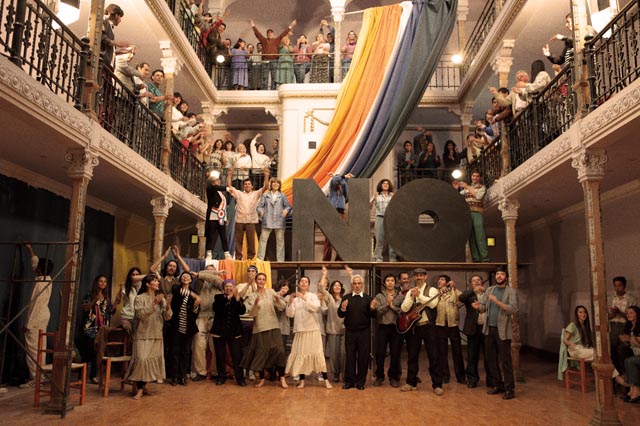“Playing as part of the Director’s Fortnight, Pablo Larraín‘s No is exactly the kind of film you hope to stumble across at Cannes,” writes James Rocchi at the Playlist, “a film that hadn’t been on your radar until buzz from too many quarters too diverse to be ignored made you seek it out, discovering a film that’s extraordinarily well-made, superbly acted, funny, human, warm, principled and, yes, as enthrallingly entertaining as it is fiercely moral and intelligent. Set in Chile in 1988, No stars Gael García Bernal as Rene, a ‘creative’ at an ad agency…. After 15 years of military rule under Pinochet, and responding to global pressure, Chile is going to have a plebiscite to continue, or end, the dictatorial era of rule that began with a bloody coup d’etat lead by the General-turned-President in 1973. And Rene is asked to run the campaign for the ‘No’ side… even as his privileged, patrician boss Lucho (Alfredo Castro) advises Pinochet’s inner circle. The fact is, as one of the figureheads of the ‘No’ movement explains to Rene, people afraid of communism, of change, of chaos might very well vote to keep Pinochet and his military junta in power, despite killing thousands, torturing thousands more and detaining tens of thousands, like Verónica [Rene’s estranged wife, played by Antónia Zegers], illegally. For now, for most Chileans, the trains run on time, and Pinochet’s excesses don’t seem to matter to those who would keep the status quo. Unless Rene and his team can change their minds.”
For Guy Lodge, writing at In Contention, No, “the final installment of his purported trilogy of pincered Pinochet-era satires,” is Larraín’s “most narratively robust and emotionally rousing film to date, a hearty celebration of hard-earned democracy spiked with just enough of the director’s acidly crooked humor to remind us whose house we’re in.” Larraín “and cinematographer Sergio Armstrong riskily and rather brilliantly eschew the stately, mannered compositions of Post Mortem for grubby Academy-ratio video stock that lends the whole film a musty, matt archival sheen. In an unsubtly effective development, the framing opens up as Bernal and his team edge closer to victory, culminating in a gracefully orchestrated crowd scene as conducive to an involuntary throat-lamp as any Hollywood fight-for-your-right epic. To see this pristinely nasty formalist come over so sincerely stirring, without departing from the bristly preoccupations and tonalities that brought us this far into the trilogy, is exciting in or out of a festival context; that No is languishing comparatively unattended in Directors’ Fortnight while the tin-eared politicizing of After the Battle makes the Competition grade is utterly bewildering.”
“Bernal’s embodiment of Rene’s burgeoning convictions about his activism allow No to become more than merely a skillful reenactment,” writes indieWIRE‘s Eric Kohn. “He’s the movie’s soul.”
“Following a model not unlike that of Dustin Lance Black’s screenplay for Milk, [screenwriter Pedro Peirano (The Maid)] has Rene assemble a group of trusted collaborators,” writes David Rooney in the Hollywood Reporter. “But the opportunities for character development and inter-personal conflict are under-explored, instead favoring painstakingly detailed accounts of the rival campaigns…. But while the film’s human drama—including Rene’s melancholy attempts to reunite his family—is a little low on emotional impact, the nitty-gritty of the campaign’s evolution provides an engrossing narrative.”
For the Guardian‘s Xan Brooks, No “lacks the bite of the director’s previous work. Where Tony Manero and Post Mortem came steeped in the pitch of the Pinochet regime, this one plays out at the end, with the swamp being drained and a happy ending in sight. All of which makes for a brighter, flatter, less troubling picture. Success, on the whole, is so much less interesting than calamity.”
“It’s clear that the director of the dark and thematically layered Post Mortem wasn’t interested in making a rousing Hollywood movie about the victory of civil society against an evil dictator,” writes Lee Marshall in Screen. “Neither is he quite comfortable with playing No as a comedy about Chile’s old-fashioned ‘no pasaran!’ leftists learning to embrace the language and methods of soft drink and microwave ads—though there is some of this. But No never really carves out a third way, or establishes a strong theme, outside of the timid suggestion that for many Chileans, little changed after the dictator’s exit.”
Still, Variety‘s Leslie Felperin suggests that No “has the potential to break out of the usual ghettos that keep Latin American cinema walled off from non-Hispanic territories. The political backdrop has immediate relevance for any nation that is facing or has recently faced a potential regime change (France, the US, Russia, most of the Arab world), while the upbeat, pro-underdog ending provides hope that even under the most adverse-seeming conditions, the good guys sometimes win. And with the international success of Mad Men, marketing campaigners should think about capitalizing on viewers’ fascination everywhere with portraits of the advertising industry itself, engagingly scrutinized here with a delicious, Matthew Weiner-style eye for period detail.”
More from Fernando Ganzo (in Spanish) at Lumière; and here you can watch a Chilean television report on the making of the film and the “No” campaign.
Updates, 5/20: As of Saturday, Time Out New York‘s David Fear declared No to be “the closest thing to a masterpiece that I’ve seen so far here in Cannes.”
“The comedy in Larraín’s earlier films was pitch black,” writes Demetrios Matheou for Sight & Sound. “Now, befitting its more upbeat historical moment and the sheer jolliness of the No campaign, it is much broader. In fact, it’s as if the director is applying Rene’s maxim, ‘a little lighter, a little nicer,’ to himself.”
Update, 5/23: “No is by far the strongest movie in Mr. Larraín’s trilogy, and one of best selections at Cannes so far,” writes Manohla Dargis, who interviews the director for the New York Times. More from Melissa Anderson at Artforum; and Sony Pictures Classics has picked up North American rights, reports Jay A. Fernandez at indieWIRE.
Updates, 5/26: “More nuanced and talkative, and depending less on metaphor and atmosphere, No replaces Tony Manero‘s frantic compositions and the implacably controlled widescreen images of Post Mortem with an approach that risks aesthetic affront,” writes James Quandt in the National Post. “Larraín maintains a studiously ambiguous attitude toward the No campaign, celebrating its success in winning the referendum—though the outcome is known from history, the film still manages to be tense, suspenseful—while asking what was sacrificed in that victory. Politics become product, the suppression of facts in favor of anodyne, idealized images, ideas replaced by slogans, history rendered silent: the director seems to situate the debased state of contemporary politics in this transformation. The No of his title takes on ominous new meaning in that light.”
“The video image is fittingly unstable, its blurs and muddy washes of color mirroring NO’s attempt to fight Pinochet’s totally opaque regime with less-than-transparent euphemism—spectacle versus spectacle.” The LA Weekly‘s Karina Longworth suggests that No is “perhaps the ultimate Situationist movie.”
Update, 5/27: For Mike D’Angelo, writing at the AV Club, No is “hands down the funniest movie I’ve seen all year… I looked in vain for a hint of contemporary relevance, and couldn’t work up any real interest in García Bernal’s relationship with his semi-militant ex-wife and his young son, but was generally laughing too hard to focus on the flaws.”
Cannes 2012 Index: a guide to the coverage of the coverage. For news and tips throughout the day every day, follow @KeyframeDaily on Twitter and/or the RSS feed.





